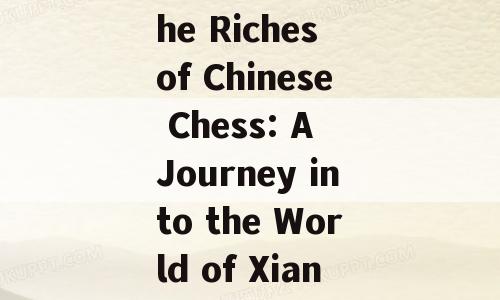Introduction:
As an ancient Chinese game, xiangqi has a history of more than 2,500 years. Also known as Chinese chess, it is not only a popular game in China but has also gained worldwide popularity. In this article, we will delve into the world of xiangqi, exploring its rules, strategies, and the cultural significance it holds.
The Rules of Xiangqi:
To begin with, xiangqi is played on a board of 9 lines and 10 columns, with a total of 32 pieces for two players. Each player has 16 pieces, including a general, guards, elephants, horses, chariots, and soldiers. The objective of the game is to checkmate the opponent's general, forcing it to be captured.
Xiangqi Pieces:
Each piece in xiangqi has unique movement patterns and plays a crucial role in the game. For example, the horse can move in an "L" shape, the chariot can move straight, and the elephant can move diagonally two squares. Understanding the movement of each piece is essential for mastering the game.
Strategies in Xiangqi:
Xiangqi requires both strategic thinking and tactical prowess. Players must *** yze the position of their pieces, anticipate their opponent's moves, and plan their strategy accordingly. Some common strategies include controlling the center, developing a strong defense, and creating threats to the opponent's general.
Cultural Significance of Xiangqi:
In addition to being a game of skill, xiangqi holds deep cultural significance in Chinese society. It reflects the Chinese values of wisdom, patience, and strategy. Moreover, xiangqi has been a popular theme in Chinese literature, art, and film, making it an integral part of Chinese culture.
The Influence of Xiangqi on the World:
As a traditional Chinese game, xiangqi has influenced numerous other chess variants. For instance, the game of shogi, also known as Japanese chess, was inspired by xiangqi. Furthermore, xiangqi has been recognized by UNESCO as part of the Intangible Cultural Heritage of Humanity, highlighting its global significance.
Learning Resources for Xiangqi:
For those interested in learning xiangqi, there are numerous resources available. Online platforms offer tutorials, interactive games, and communities where players can discuss strategies and share their experiences. Additionally, books and videos are available for those looking to improve their xiangqi skills.
Conclusion:
In conclusion, xiangqi is a rich and complex game that requires skill, strategy, and patience. As an ancient Chinese tradition, it holds great cultural significance and has influenced the world of chess. Whether you are a beginner or an experienced player, the world of xiangqi offers endless challenges and opportunities for growth. So, why not embark on this exciting journey and discover the riches of Chinese chess?















还没有评论,来说两句吧...